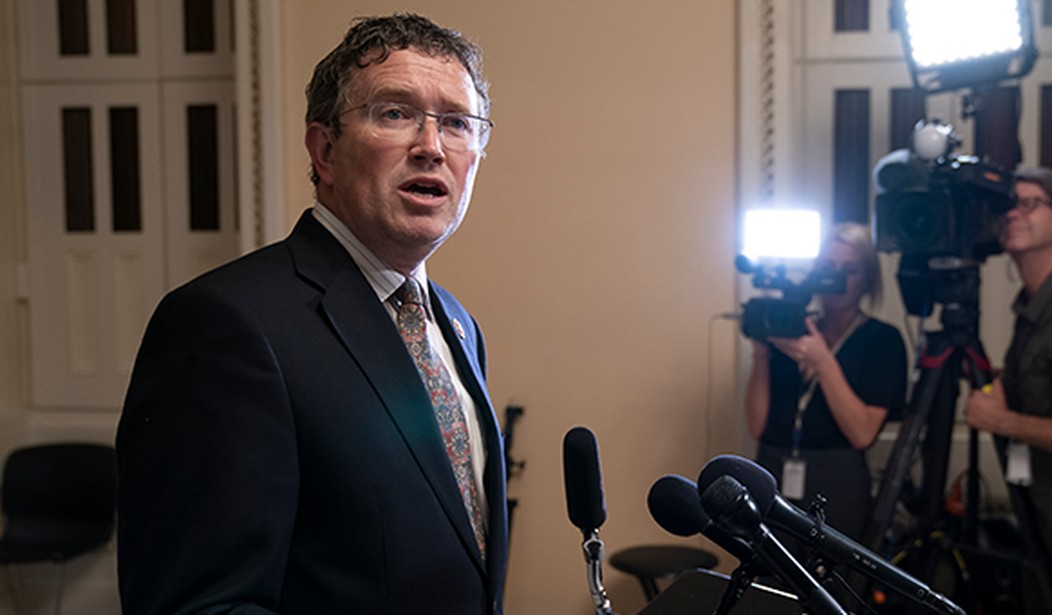During a House Judiciary Committee hearing on Tuesday, Rep. Thomas Massie (R-KY) questioned Attorney General Merrick Garland about his appointment of Jack Smith as special counsel to oversee investigations into Donald Trump.
Massie began his line of questioning asking to submit into the record an amicus brief from former Attorney General Ed Meese and two law professors, as well as an article from The Heritage Foundation's Hans von Spakovsky, questioning the legality of appointing Smith.
... Meese, Calabresi, and Lawson argue that Garland lacked the power to appoint Smith because the attorney general has no authority to appoint a “private citizen to receive extraordinary criminal law enforcement power under the title of Special Counsel.”
First, they point out that there is no federal statute establishing an “Office of Special Counsel in DOJ.” Second, even if one ignores the absence of such a specific statute, there is also no statute authorizing the “Attorney General, rather than the President by and with the advice and consent of the Senate, to appoint such a Special Counsel.”
The special counsel, they note, has more power that any of the 94 U.S. Attorneys who prosecute cases across the country. Their authority is limited to the jurisdictions in which they are appointed. Moreover, U.S. Attorneys are nominated by the president and have to be approved by the Senate under the Appointments Clause in Section 2 of Article II of the Constitution.
Yet Jack Smith has nationwide authority to pursue his prosecutions, and indeed has indicted Trump in two separate jurisdictions (D.C. and Florida), and was neither nominated by the president nor confirmed by the Senate. This, according to the amicus brief, violates basic constitutional requirements. (The Heritage Foundation)
Recommended
Massie pressed the attorney general on whether Smith was nominated by President Biden or confirmed by the Senate. To both questions, Garland responded, "No, he was not."
“When was the special counsel statute passed?” Massie then asked.
“There is no special counsel statute," Garland acknowledged. "There was an independent counsel statute that was expired."
Is Special Counsel Jack Smith's office Constitutional? Unlike U.S. Attorneys, he wasn't appointed by the President and wasn't confirmed by the Senate.
— Thomas Massie (@RepThomasMassie) June 4, 2024
Congress never even authorized a Special Counsel office to exist. We shouldn’t pretend this position is legal or independent. pic.twitter.com/3UOvvP0Aoo
Here’s the amicus brief that former AG Meese submitted to SCOTUS:https://t.co/dZ2271TGZy
— Thomas Massie (@RepThomasMassie) June 5, 2024
"It seems like you've created an office that would require an act of Congress, yet there's not an act of Congress that authorizes that. And even if it didn't require an act of Congress, and you've already admitted that there was no act of Congress that established this office, it would still require, according to the Constitution, a nomination by the President and confirmation by the Senate," Massie said to Garland.
Yesterday in the Judiciary committee, I asked AG Garland if Jack Smith’s Special Counsel office is even legal, and submitted former AG Meese’s amicus brief on that topic for the record. A few hours later, Judge Cannon agreed to allow that question to be debated in the courtroom. pic.twitter.com/TedmtbkmMP
— Thomas Massie (@RepThomasMassie) June 5, 2024

























Join the conversation as a VIP Member